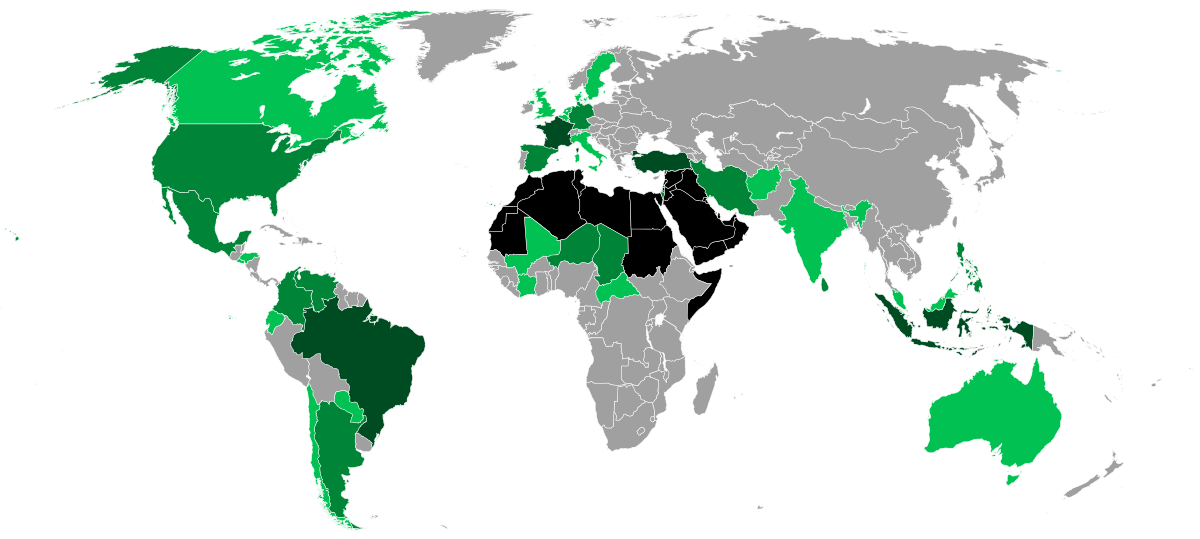GSC Newsletter 21: 1 #5
On Editing an Interdisciplinary Volume on the Arab Diaspora
Mariam F. Alkazemi and Claudia E. Youakim

In the academy, we often work in silos, where we focus on a subject area within our discipline – in this edited volume, we break that cycle! Arab Worlds beyond the Middle East and North Africa includes a wide array of disciplines and goes beyond the academy to integrate work completed by various contributors (e.g., diplomat, directors, artist, professors, researchers) who also come from interdisciplinary backgrounds (e.g., sociologists, journalists, historians, political scientists, and more). With this purposefully inclusive approach in authorship, our co-edited volume offers an interdisciplinary framework to understanding migration patterns of Arab persons in nation-states that are majority non-Arab from different perspectives.
Each chapter unpacks the diasporic journey as experienced through immigrant communities across the globe and in what sociologists refer to as ‘host’ societies. Throughout the volume, authors unpack the social, cultural, political, and economic landscape and social networks that unfold for immigrant families and illustrate how Arab communities grapple with and navigate their new ‘host’ states and turning them into their new ‘home’ states. Yet, ‘home’ as we see, continues to remain in question and is largely expressed and determined by the level of integration that a group feels from their nation-state communities (policies, practices, political, economic climate). Additionally, the volume also displays a unique contribution of artwork by a globally renowned artist, Manal Deeb, whose art focuses on Palestinian ethnic identity and living in exile.
By displaying Deeb’s artwork on the cover, the book approaches scholarship widely and provides an experiential experience for audiences interested in the Arab diaspora. Beyond the artwork, the book offers a number of examinations of media representations, including the contributions of Arab Americans on the U.S. music industry prior to the Great Depression as well as more contemporary television shows in Germany portraying refugee children. Further, a chapter analyzes news coverage in Argentina of the Syrian conflict as it examines the role of the Arab diaspora in the Argentine intervention. The breadth of these examples helps to crystalize the interactions between diasporic communities around the world and the mass media.
The edited volume unpacks the diasporic experiences of Arabs and illustrates that the trajectories from the region heavily depend on one’s nation-state and a number of factors, including but not limited to the time they emigrated and the resources that they possessed during that time (e.g., economic means, social networks in a receiving society, etc.). For instance, if we just focus on the year of immigration, the movement and restrictions that are mandated from one country to another groups of persons travel to one place in one year, but another nation state a different year depending on gatekeepers, too. The complexity of Arab identity is displayed in the various emigration trajectories with Palestinians in Chile, Lebanese in Brazil, Hadhramis in Singapore, Maghrebis in France, Syrians in the United States, and more. Our motivations for this edited volume comes from noticing gaps in the literature that do not reflect our understanding of the world as we travel through it. We met as graduate students at the University of Florida, and our effort to co-edit a volume a decade later is intended to fill a gap and introduce a text that many Arabs around the world can feel personally connected to either in their struggle to adapt to a host society or in their effort to connect with their heritage.
We worked hard to ensure that the text is written for a wide audience, and we worked hard to retain the original voice of the authors as we edited various sections of the book. We feel that the current book contributes to various fields including literature on ethnicity, immigration, international relations, media studies and more generally Arab studies. Beyond the academic background of the reader, we feel this book would be an enjoyable read for anyone who is interested about these topics, cultures or travel. It is our hope that any intellectual trying to figure out where they belong are inspired by the many narratives provided on Arab communities, which describes the joys and sorrow of being part of an ethnic community outside the Middle East and North Africa.
Mariam F. Alkazemi is Assistant Professor at the Robertson School of Media and Culture at Virginia Commonwealth University (VCU).
Claudia E. Youakim is Deputy Director of Knowledge Management and Research at the Center for Inclusive Business and Leadership in the Olayan School of Business at the American University of Beirut.
Back to Meridian 1

